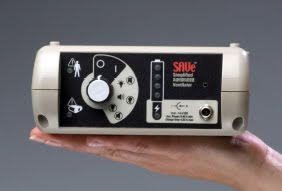Precedential No. 33: Opposer Proves Priority Based on Sale of Ventilators for Test Purposes
Opposer Automedx breathed more easily after the Board sustained its Section 2(d) opposition to registration of the mark SAVE for medical "ventilators," finding the mark likely to cause confusion with Opposer's mark SAVe for portable ventilators. The sole contested issue was priority of use, and the Board sided with Opposer Automedx based on its earlier sale of ventilators to the Air Force for purposes of testing and refinement. Automedx, Inc. v. Artivent Corporation, 95 USPQ2d 1976 (TTAB 2010) [precedential].

Judge Bergsman laid out the facts and the issues in his usual well-organized fashion. This posting will attempt to hit the high points.
Applicant was entitled to claim the filing date of its I-T-U application, October 10, 2006, as its date of first use. Automedx relied on sales prior to that date, which sales were "made for purposes of testing and were completed prior to FDA approval of opposer's ventilators for human use." Applicant contended that those sales constituted neither bona fide use, nor lawful use.
Bona Fide Use: As to the sales themselves, the issue was "whether Opposer's April 2005 and August 2006 sales were test sales for legitimate commercial purposes in the ordinary course of trade or token sales to reserve the mark for registration." The Board found the former and not the latter.
The Board disagreed with Applicant's assertion that FDA approval is required before a sale may be bona fide. The sales were "mutually beneficial in that they allowed the military to test the initial units before committing to a larger purpose, and they permitted opposer to refine the produce to make it commercially attractive." These were arms-length transactions in which properly labeled SAVe ventilators were sold and transported in commerce. The fact that they were sold for testing purposes does not make the sale and transportation of the goods less legitimate.
Applicant pointed to the lack of documentary support for the April 2005 sale, but the Board found the testimony of Opposer's witnesses to be consistent, definite, and without contradictions.
Lawful Use: The determination of lawful use involves two questions: (1) whether there is a previous determination that a party has not complied with a relevant statute; or (2) whether there is a per se violation of a statute. Here, there was no prior determination of illegality, and so Applicant relied on the per se prong of the test.
According to applicant, if the portable ventilators are goods in trade, which they must be in order for opposer to claim priority, then the sale of the portable ventilators must be approved for human use by the FDA to constitute lawful use in commerce.
The Board, however, quickly dismissed this argument: "While they were not sold for human use, they were bona fide sales and there is no perceptible violation of any laws or regulations." There is no requirement of FDA approval for goods sold to the military for testing purposes.
And so the Board sustained the opposition.
TTABlog comment: The devices were tested on the laboratory bench and in swine studies. What if the tests had included human guinea pigs? BTW: FDA approval was obtained in 2007.
Even if the Board found these early sales not to qualify as trademark use, would they have constituted use analogous to trademark use for priority purposes? Or were they not public enough?
Text Copyright John L. Welch 2010.




0 Comments:
Post a Comment
<< Home